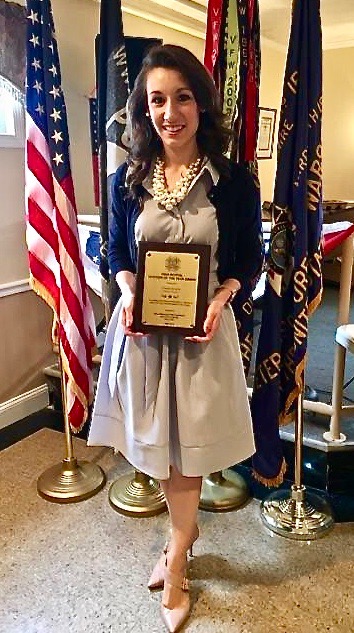“The Constitution is Your Textbook”: An Ashbrook Teacher’s Classroom Revolution
December 24, 2020

Nichole Iacuzio graduated in December 2017 from Ashbrook’s Master of American History and Government (MAHG) program. Long before she finished her degree, the program had transformed the way she teaches. Her studies did even more, she says. They “revolutionized the American government course at my school.”
Iacuzio teaches ninth grade government at Pinkerton Academy in Derry, New Hampshire, an independent school that provides 9th through 12th grade education for six area towns. (Its contract is renewed yearly by voters, and it follows all the state curriculum standards.) With an enrollment of about 3200 students, Pinkerton is the largest independent high school in the United States. Iacuzio works with four other colleagues to teach the government class all 800 freshmen must take.
Iacuzio left New England for college, venturing to Troy University in Alabama, before returning home to teach at the high school she herself had graduated from. She intended to travel again—intellectually, at least—after beginning her career. Graduate work, she felt, would keep her in touch “with what my students were going through.” During her second year at Pinkerton, she enrolled in an online Masters of education program, “one of those where you read an article and write a short paper or post a reaction to an online bulletin board. Then you wait 48 hours before anyone responds.” She didn’t feel engaged. “I love to read, and I don’t mind writing,” Iacuzio said. “But I need the immediate feedback you get in a live class discussion.”
The program focused on teaching methods, not the civics content Iacuzio really needed. But one project allowed her to relate a teaching approach to civics. Doing research for it, Iacuzio read an article that footnoted the Ashbrook Center. Curious, she Googled Ashbrook—and began reading about a Masters program that offered online courses using live interactive web technology, so that professors and students could see and talk to each other during class sessions. The program also offered on-campus summer classes. She decided to give these a try.
She convinced two close friends to drive out with her to Ohio, making an adventure of it by stopping at Niagara Falls. As they flew home, Iacuzio settled into to her first course, “The American Founding,” taught by Ashland University Professor Chris Burkett and Pepperdine Professor Gordon Lloyd. “I was blown away by how much they knew,” Iacuzio said. For two days she listened. On Wednesday she ventured a question—and soon found herself comfortably drawn into discussing the complex series of debates that gave birth to our framework of government.
That fall, Iacuzio found herself unwilling to replay the civics curriculum she’d been using—a patchwork of slideshows and textbook summaries. She asked her colleagues, “How come our students don’t read the Constitution?” An older teacher remembered a time at Pinkerton when students had read this fundamental document. “Somehow it had gotten lost.” Iacuzio’s colleagues agreed to try again. “When they did, they were really excited about it.”
Students complained about having to dig out the fundamentals of American government directly from our founding document. But soon they too were engaged. They discovered things in the Constitution they didn’t expect: such as the mention in Article I, Section 8 of “Piracies . . . committed on the high Seas.” How did pirates—characters from popular films—get into the Constitution? Iacuzio assured the students that the pirates were real, and the threat they posed to commercial shipping during the early republic was “a big concern.”
Today Iacuzio tells students entering her civics course, “The Constitution is your textbook.” She also tells them, “Even if you don’t like every aspect of our governmental framework, you need to understand the debates and arguments that shaped it.” Many of the problems confronting the Founders still drive political debate today.
For example, the Electoral College—dismissed by many as outdated—was devised in response to a larger debate at the Constitutional Convention over the balance of power between small states and more populous ones. Each year Iacuzio asks students to read excerpts of these debates and then to write an essay arguing either in favor of or against the Electoral College system.
Social studies teachers, Iacuzio says, are curators of the evidence left us by the past. “My challenge as a teacher is to find reliable sources that reveal the controversies shaping our history—so that the students can have a healthy discussion” of them. “The MAHG courses exposed me to many primary documents. You know that each document carries the bias of its author,” but selecting documents from both sides of a debate diffuses “the criticism you sometimes hear from parents, that teachers convey only their own perspective. When you bring in primary sources and let the voices of the past speak for themselves, students are free to form their own opinions.”
To arrive at informed opinions, Iacuzio says, students need to learn how to analyze what they read—whether it is a document or photo from the past or a news article about current politics. Recognizing the bias of each voice allows a more complete understanding. Primary documents show historical figures “struggling with controversial questions, just as we are today. You might see their opinions change due to events. Our MAHG professors reminded us that while hindsight is 20/20, the people who lived before us didn’t know what their decisions would lead to.”
Citizens today have no greater certainty about the future than the thoughtful leaders of the past did. Still, understanding how our forebears reasoned through problems can help us reason through the challenges of today.
Iacuzio does aim to teach respect for one thing: our remarkably durable Constitution, the first workable framework for republican government ever devised in the history of the world. Students need to be aware that the choices they make as voters could alter that 230-year-old agreement. “If citizens don’t know our Constitutional structure,” Iacuzio says, “they run the risk of allowing that structure to topple.”

